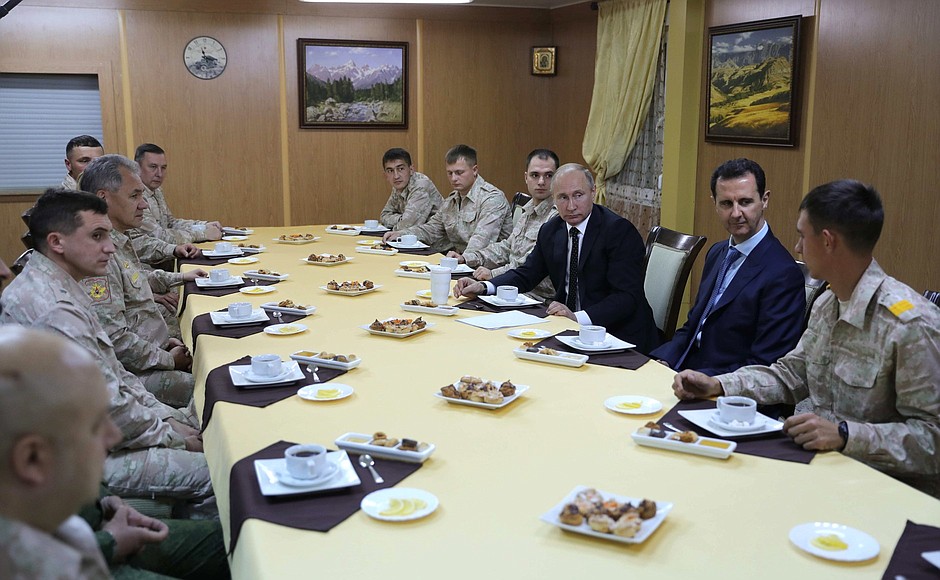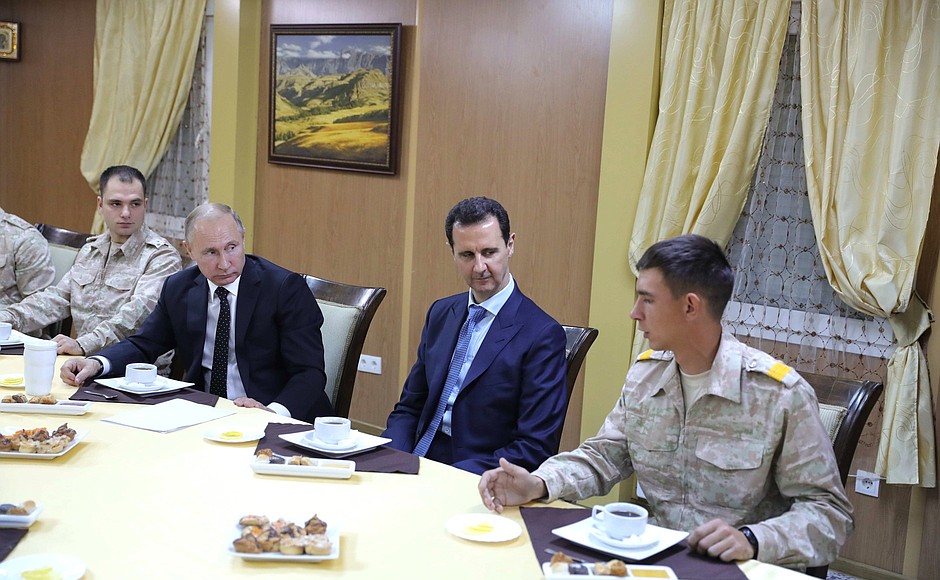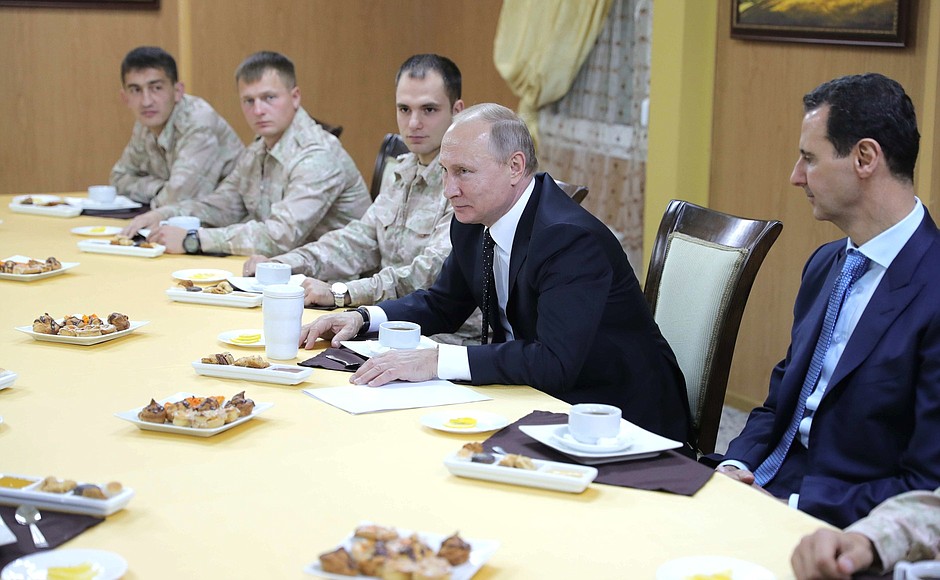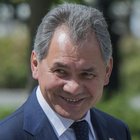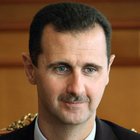President of Russia Vladimir Putin: Good afternoon, comrades.
It is good to see you in a less formal setting, not in formation. I want to thank you again for what you did here in Syria, both directly and in contact with your Syrian comrades in arms.
I understand this is one of them, General Suheil al-Hassan. I have just talked with President Assad, and your Russian colleagues said the same – that you and your service members are fighting very resolutely, bravely and effectively. I hope this interaction will continue to bring us success.
I understand there are pilots here as well.
Minister of Defence Sergei Shoigu: General Ivanayev …
Vladimir Putin: He was wounded and removed from the battlefield?
Are our pilots here?
Sr Lieutenant A. Vedyashchev: Yes, Sr Lieutenant Vedyashchev.
Vladimir Putin: What unit are you from?
Sr Lieutenant A. Vedyashchev: Central District.
Vladimir Putin: How long have you been here?
Sr Lieutenant A. Vedyashchev: About two months – August and September.
Vladimir Putin: I was shown the results of your work in combat. Good job.
Sr Lieutenant A. Vedyashchev: I serve the Russian Federation!
Vladimir Putin: Congratulations.
As we said before, I am confident that you can confirm that participation in combat operations dramatically increases the level of professional skills.
Sr Lieutenant A. Vedyashchev: That is affirmative. The training range is for learning things. Here, it is real work, and the experience that you gain while doing actual work cannot be obtained in civilian life.
Vladimir Putin: True. At a training range, you only shoot at targets, but here you are targets as well. It is a big difference.
Deputy Commander D. Klimenko: Comrade Supreme Commander-in-Chief, Deputy Commander of the Euphrates Group in charge of fire damage. Missile forces and artillery.
Comrade Supreme Commander-in-Chief, perhaps, most importantly, you are right, we are testing weapons here, and many weapons really have been tested.
But this is not the most important thing. The army and its officers, sergeants, and troops are the most important asset of the state and its Armed Forces.
Comrade Supreme Commander-in-Chief, our achievements here have reinforced the belief of the soldiers, sergeants and officers in our victory under your guidance.
Vladimir Putin: And they have attained this victory.
Dmitry Klimenko: Yes, sir, and this may be the most important thing. Equipment comes second after people.
Vladimir Putin: Equipment is important, and you must know how to use it. Am I right, Mr Mamatov?
Yusup Mamatov: Yusup Mamatov, deputy battalion Commander, military police.
Vladimir Putin: Was it you who broke out of an encirclement?
Yusup Mamatov: Yes, sir. A combined military police platoon was monitoring the ceasefire. On September 19, when we came under mortar fire, we assumed a perimeter position in accordance with our combat duty assignment and indicated our positions by hoisting a Russian flag so that our pilots would see it.
Our assault planes delivered a crushing blow to the terrorists, who sustained heavy losses. They pulled back, opening a gap, which I decided to use.
We moved at top speed towards Hama, where our troops were deployed. Soon we saw an evacuation team in armoured vehicles moving under protection of combat helicopters. They helped us to leave the zone of hostilities without suffering a single loss. This is how we reached our deployment area.
Vladimir Putin: Good job.
Defence Minister Sergei Shoigu: These are our medics, a field team.
Tatyana Kovalyova: Comrade Supreme Commander-in-Chief, Nurse Kovalyova, senior nurse at the medical team.
We have been sent here to provide humanitarian and medical assistance to the civilian population of Syria. We went to the suburbs of Homs and Latakia to give medical treatment to the people.
Of course, it breaks your heart when you see children with old blast injuries. But their spiritual suffering was even more horrible than their wounds.
It was frightening, but we did our job; we helped the local people. They are very grateful to us.
Vladimir Putin: How many people have you helped at your hospital?
Tatyana Kovalyova: Ours is a mobile team, and so we have helped some 5,000 people during our stay here, during three months.
Sergei Shoigu: Overall, we have helped nearly 57,000 people.
Vladimir Putin: How many people worked at the hospital?
Tatyana Kovalyova: We had two or at most three teams of doctors and nurses who worked with the Centre for Reconciliation. But usually one or two teams comprising a doctor and a nurse worked with the centre.
Vladimir Putin: Did you have the necessary medicines and equipment?
Tatyana Kovalyova: We brought along everything we needed, set up in a suitable building or put up a tent and provided medical assistance. We had all the necessary equipment, and we provided quality assistance.
Vladimir Putin: Good.
Sergei Shoigu: Bomb disposal squads have also done very well.
Artyom Rubanov: Sergeant Rubanov, International Anti-Mine Centre of the Russian Armed Forces.
This is our fourth mission here.
I apologise, I am a little nervous.
Vladimir Putin: No problem. He does not get nervous when he is de-mining but now he is. (Laughter.)
Sergei Shoigu: Mr President, this sergeant personally defused 1,800 mines and explosive devices with his own hands.
Vladimir Putin: How many?
Sergei Shoigu: 1,800.
Artyom Rubanov: More than 1,500. I do not count them, sir.
This is my third tour of duty. I have been to Palmyra, Aleppo, and now Deir ez-Zor. I have already said how many mines have been defused.
Vladimir Putin: Where did you learn to do it?
Artyom Rubanov: At the International Anti-Mine Centre.
Vladimir Putin: How long did the training take?
Artyom Rubanov: We have training every day. Everything is great. We study explosive hazard and improvised explosive devices. Plenty of improvised and bizarre bombs are found here, sometimes what you would never expect to see.
My most memorable incident took place during my first tour, in Palmyra, as we were de-mining the historical part of the city. We were on an engineer reconnaissance mission in a palace. We discovered a well and decided to go down there.
As I was getting down, it felt quite eerie. The well was 20 to 25 metres deep. At the bottom, we found a tunnel, with a tripwire mine stretched across the entrance.
I removed the tripwire and started moving forward where I found a large cache of explosives and ammunition. We decided to destroy them all, which I did.
This was perhaps my most memorable task here. Must be because it happened during my first tour.
Vladimir Putin: Did the tunnel collapse?
Artyom Rubanov: Nothing was left of it.
Vladimir Putin: Was there a lot of ammunition?
Artyom Rubanov: Quite a lot, sir. I cannot tell you the exact number but there were many explosives.
Vladimir Putin: How many people are working with you on the ground?
Artyom Rubanov: With me personally?
Vladimir Putin: Yes.
Artyom Rubanov: Eleven people in my division. Three teams. We travel on assignments in three teams.
Vladimir Putin: Please send my regards to them.
Artyom Rubanov: Thank you.
Vladimir Putin: No, thank you.
Andrei Medvedev: Deputy Commander of the Special Operations Squad, Lieutenant-Commander Medvedev. We have been on tour since September, and were deployed to a number of regions. The active phase of the offensive against Al-Qaryatayn was especially memorable for us.
Our team was tasked with observing the enemy and directing air support. However, it so happened that at the same time government troops were on the offensive, so we just used this opportunity to support our comrades. As a result, our team destroyed about 50 fighters driving pick-up trucks equipped with anti-aircraft mounts.
When the enemy retreated from its positions, and the government troops took them, observers noted that many vehicles were converging in one place as they retreated. Using technical reconnaissance equipment, we identified their location and signalled it to the air forces.
Let me say that the air force was very prompt and worked very well in conducting highly efficient strikes.
Vladimir Putin: Did they hit all the targets?
Andrei Medvedev: Yes, sir!
Vladimir Putin: Way to go.
Ruslan Zabirov: Operator pilot of a Mi-35 helicopter. This is my second assignment here. I have about 150–180 combat flights. We operated from Shayrat Airbase, Tiyas Military Airbase, Deir ez-Zor Airport and Khmeimim air base.
The most memorable moment was when we were tasked at the Shayrat Airbase to help government troops seize dominant terrain near Palmyra. We left with two Mi-35s followed by a Mi-8.
When we arrived, we saw the fighters from afar, and took out two antiaircraft mounts right away, striking at the fighters with unguided missiles.
We then started turning left towards the airfield. There was dust there after the shelling. Suddenly, we noticed two more anti-aircraft mounts that tried to hit us. We turned back, got them and left for the airfield.
Vladimir Putin: Left for the airfield. (Laughter) You say this so casually, as if you left on a taxi.
Ruslan Zabirov: You just get used to this kind of thing.
Vladimir Putin: It is true, but you still have to be cautious. The work you do is very challenging, especially for helicopters. Thank you all once again.
President of Syria Bashar al-Assad (re-translated): I would like to thank all of you for your work and the excellent cohesion of Russian and Syrian service members. We have been shedding our blood for five or six years already.
Moreover, our unity is manifested not only in combat action. We have a large number of mixed families. Their children live both in Syria and Russia. They are closely intertwined culturally and socially.
Briefly put, our blood was intertwined in families several decades ago when they had children.
Now blood has brought us together for a different reason. We are shedding our fraternal blood for a good cause.
The blood we have been forced to shed is much more powerful in all respects than the blood that is spilled by terrorists under our onslaught.
Several days before the liberation of Abu Kamal, I had a telephone conversation with Brigadier General Suheil at the time when he and his servicemen were attacked by ISIS that sent several cars stuffed with explosives against them.
On that day, these mobile jihads killed about 60 of his people. He lost about the same number of people on each of the two previous days.
But this blood that was shed by his soldiers liberated Deir ez-Zor and Abu Kamal and all other cities of the eastern zone. We do not differentiate whose blood it was – Russian or Syrian. This does not matter at all.
I am sure that in a hundred years or less our grandchildren and great grandchildren will study our history and the exploits of Russian and Syrian warriors to the same extent both in Russian and Syrian schools.
This victory and your visit, Mr Vladimir Putin, fill me with personal pride. I am so glad about your visit, your first visit to Syria and for this very reason. This is a great honour for me.
Vladimir Putin: Thank you. I would like to wish all of you success.
The Defence Minister reported to me on this heavy fighting and the losses we have just spoken about.
Bashar al-Assad: You should know that General Suheil al-Hassan does not see his family at all. He has been living on the battlefield for several years now.
Vladimir Putin: You should see them.
Suheil Salman al-Hassan: (re-translated): Hopefully after the victory.
Vladimir Putin: I wish you success and want to thank all of you once again. Our holiday, the New Year, is approaching. Have a happy New Year. I would like to wish happiness to you and your families and friends.
